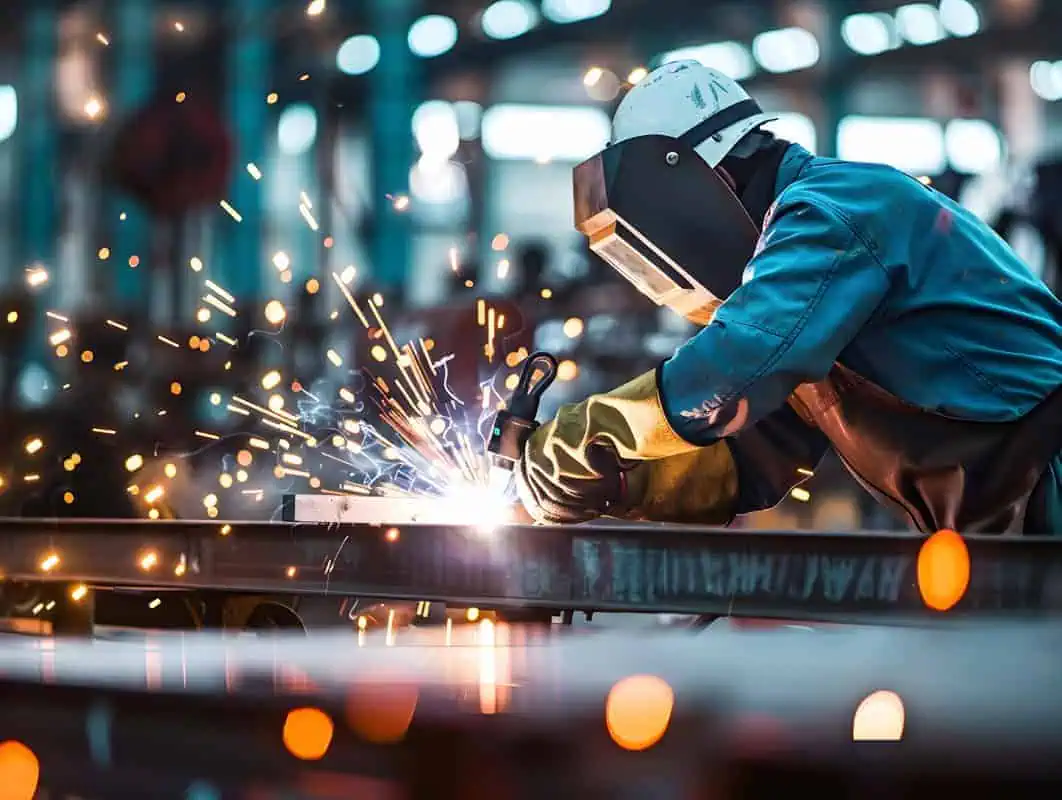For decades, Champ Metal Fabrication has provided high-quality metal fabrication services for a broad range of applications and industries. We’re committed to continuous improvement, and so we’ve diversified our offerings to position ourselves for growing partnerships with tier-one suppliers and original equipment manufacturers (OEMs).
In 2020, our successful metal fabrication company rebranded to Champ Metal Fabrication to better reflect our capabilities. We aim to be your full-service partner for metal fabrication and assembly, providing medium- to high-volume production as well as prototyping. Champ employs industry best practices, key performance indicators, and an ISO 9001:2015-certified quality management system to ensure that you’ll receive superior products. Learn more about our service offerings, the materials and industries we work with, and how Champ’s metal fabrication services can support your business.
Our Metal Fabrication Capabilities
We offer a wide array of metal fabrication processes to best suit our customers’ varied needs and application requirements.
PROTOTYPING
While we have the capacity for high-volume orders, we also provide prototyping/first article services for our customers. By working closely with your engineers or provided designs, our team will help you confirm proof of concept before fabrication begins. This allows you to refine and optimize your design and identify any flaws before incurring the expense of large-scale manufacturing.
MACHINING
Today, this subtractive manufacturing method is typically carried out by an array of computer numerical control (CNC) equipment. Automated machinery like CNC mills and lathes use tooling directed by computer-aided design and manufacturing (CAD/CAM) software to cut material away from a metal billet and shape a workpiece in the preferred dimensions and profile.
CUTTING
Ubiquitous with metal fabrication, cutting can involve anything from standard or automated machining equipment to advanced lasers, waterjet cutters, or plasma torches. The chosen equipment will either generate cuts in raw material, which is typically sheet metal, to break the material down into smaller portions, or remove excess material to shape a workpiece. At Champ, we’re experienced with laser cutting processes.
SHEARING
The shearing process is optimal for achieving longer cuts in metal sheets or trimming their edges. Three typical methods are available: feeding a sheet into a metal cutter horizontally, applying a tool vertically along a sheet’s length, or positioning the sheet at the edge of a surface and lowering a cutting blade over it.
STAMPING
Applicable for anything from small to large production runs and simple to complex parts, stamping utilizes a stamping press with a tool and die to shape a metal sheet into a desired profile. Equipment like press brakes, laser machinery, turret equipment, and more can create components in a variety of configurations and dimensions.
PUNCHING
Punching generates holes in metal using a die and a drill. The drill punches through the metal beneath a die and, as long as the drill’s circumference fits properly into the die, the process creates precisely sized holes. It’s a versatile technique as the cut holes can be either the desired end result as the location for future fasteners, or the metal blank that’s punched out is the end component itself.
DIE CASTING
Die casting is similar to plastic injection molding, in that the process heats a material – in this case, metal billets – until it is molten and ready for injection into a die. Once the metal cools, it solidifies in the shape of the die and the finished component ejects from the tooling. Other forms of casting are investment and sand casting.
FORGING
Forging is a very old metalworking technique. By applying heat to a metal billet to make it more malleable, manufacturers then pound tooling such as a hammer, an anvil, a press, or related equipment into the metal. This impact force ultimately gives the material its desired shape.
FOLDING
This fabrication technique involves folding a piece of metal to create a component with a predetermined angle. Often, folding equipment creates 90° angles, but it’s capable of smaller or greater angles, as well. As this complex process requires specialized machinery to fabricate parts, it can be more efficient to bond two panels of metal together at the required angles instead.
WELDING AND ASSEMBLY
Welding involves melting the metal of a component and pressing it against one or more additional parts to join them. The heat and compression force bond individual parts together into one assembly as the molten metal cools to form a strong joint. At Champ, we are able to offer MIG, TIG, and spot welding, and our capacity for assembly is virtually limitless. We also offer painting and powder coating to finish your product for optimal protection and pleasing aesthetics.
Advantages of Custom Metal Fabrication
Our team utilizes our extensive service offerings to deliver diverse product and assembly solutions for our customers. Champ’s fabrication capabilities are beneficial for:
- Improved throughput
- Enhanced component performance
- Faster production and turn times
- Proven quality control and analysis
- Lower production costs
- Adherence to industry quality and safety regulations and standards
Industries That Utilize Metal Fabrication
At Champ, we have valued customers in diverse industries, including:
- Agriculture
- Construction
- Consumer goods
- Electronics
- Healthcare
- Marine
- Recreational products
- Telecommunications
- Toys
- Transportation (Cars, trucks, buses, RVs, off-highway vehicles, and locomotives)
Materials We Commonly Use in Metal Fabrication
Metal fabrication offers great versatility not just in the available processes but also in its numerous compatible material options. To select the right one for your application, consider the performance properties your product should have, the environmental conditions your part will be subjected to, and if the material is the best option for your chosen fabrication technique.
Specializing in CNC machining, welding, assembly, and more, Champ Metal Fabrication is proficient with many types and grades of metals, including:
- Aluminum
- Carbon steel (sheet and tube metal)
- Stainless steel
- Steel
- Copper alloy
- Brass
- Bronze
- Iron
How to Pick a Custom Metal Fabrication Manufacturer
Selecting a custom metal fabricator that can best meet your specific needs is an important decision that will affect turn times, quality, and budget. Here are a few things to consider when making your choice:
- Capabilities and equipment. Ask yourself some questions about your project. Does my product require high-precision manufacturing? Will my services provider need to have specialized equipment or tooling to handle certain manufacturing processes or oversized components? What are my budgetary constraints? For example, manual processes are more economical, but they don’t offer the high speeds and accuracy of automated CNC equipment. Gain a solid understanding of the capabilities and machinery you require to ensure that your provider meets the specifications of your project.
- Manufacturing capacity. Even the best manufacturer won’t be the best fit for your business if the company can’t meet your capacity needs for volume, accepted production run size, and term of service. At Champ, we specialize in medium- to high-volume manufacturing.
- Background and experience. When selecting a metal fabrication services provider, it’s important to choose one with years of proven, high-quality workmanship not only in general, but in your specific field. A machine shop with experience in your industry will also be familiar with any industry standards or regulations with which production must comply. Champ has decades of experience serving small and medium-sized businesses in diverse industries.
- Material options. You should partner with a company that’s experienced in fabricating products of your chosen material. Additionally, if your service provider works with any metal suppliers, it’s important to learn their reputations to ensure your products will consist of high-quality materials and won’t incur supply chain-related delays.
Contact Champ For Your Metal Fabrication Needs
Our goal at Champ is to manufacture valuable solutions for our customers. With metal fabrication facilities in Jamestown, North Dakota, and Winnipeg, Manitoba, Champ is capable of satisfying both Buy America and Canadian ITB requirements. This also allows us to provide consistent service and avoid supply chain disruptions.
Contact us or request a quote to see how Champ Metal Fabrication can help with your specific manufacturing needs. You can also reach us at (701) 252-4630 to discuss the demands of your next metal fabrication application.


